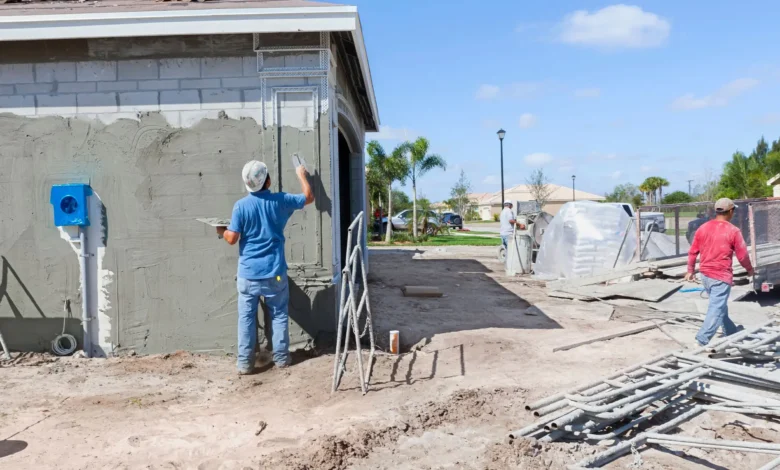The Importance of Insurance and Licensing When Hiring Stucco Contractors

When it comes to improving or repairing your home’s exterior, few materials offer the same beauty, durability, and energy efficiency as stucco. But even the best materials can fail if they’re not applied correctly. That’s why choosing the right stucco contractors is essential—not just for aesthetics, but for safety, longevity, and financial protection.
Two of the most important factors to consider before hiring a stucco professional are insurance and licensing. These credentials may not seem exciting, but they play a critical role in ensuring your project goes smoothly, safely, and legally.
1. Why Licensing Matters in Stucco Work
A licensed stucco contractor has met the legal and technical requirements set by the state or local authorities. Licensing ensures that the contractor has the proper training, knowledge of building codes, and understanding of safety standards needed to perform stucco work correctly.
For instance, in Florida, the Department of Business and Professional Regulation (DBPR) requires contractors to pass exams, prove experience, and maintain good standing to obtain and renew their licenses. This means that licensed stucco contractors have verified experience and know how to comply with strict construction laws and codes.
Hiring a licensed contractor protects homeowners in several ways:
- Quality assurance: Licensed professionals are trained to apply stucco correctly—whether it’s traditional cement-based stucco or modern synthetic EIFS (Exterior Insulation and Finish Systems).
- Code compliance: Licensed contractors follow local and state codes, ensuring your project meets all safety and durability standards.
- Legal protection: If something goes wrong, you have legal recourse through the state licensing board.
Without proper licensing, you could face serious problems down the road, including fines, failed inspections, or costly rework if the project doesn’t meet code requirements.
2. The Role of Insurance in Protecting Homeowners
Just as important as licensing is insurance coverage. Any reputable stucco contractor should carry both general liability insurance and workers’ compensation insurance. These protect you, your property, and the contractor’s team in case of accidents or damage during the project.
Here’s why insurance is crucial:
- Liability protection: If a contractor accidentally damages your home, general liability insurance covers the repair costs.
- Worker protection: Workers’ compensation insurance covers medical expenses and lost wages if an employee gets injured on the job—so you’re not held responsible.
- Peace of mind: You won’t have to worry about lawsuits or unexpected expenses during or after your stucco project.
According to a 2024 survey by the National Association of Home Builders (NAHB), nearly 60% of homeowners who hired unlicensed or uninsured contractors faced additional costs from property damage or unfinished work. That’s a risk that can easily be avoided by verifying credentials before hiring.
3. The Risks of Hiring Unlicensed or Uninsured Contractors
Unlicensed or uninsured contractors often offer lower bids, which can be tempting for homeowners trying to save money. But those savings can quickly disappear if something goes wrong.
Here are the top risks you take when working with an unqualified contractor:
- No legal recourse: Without a license, it’s difficult to hold a contractor accountable if they deliver poor workmanship or abandon the job.
- Failed inspections: Unlicensed work may not meet building codes, which can prevent you from selling your home or passing insurance inspections.
- Financial liability: If a worker is injured or the property is damaged, you may be legally responsible for the expenses.
- Hidden costs: Improper stucco application can cause water leaks, cracks, or mold growth—repairs that could cost thousands later.
In short, hiring unlicensed or uninsured stucco contractors might save money initially, but it often leads to higher long-term costs and unnecessary stress.
4. How to Verify a Stucco Contractor’s Credentials
Before signing a contract, it’s important to verify that the stucco contractor you’re hiring is both licensed and insured. Here’s how to do it:
- Ask for their license number – Every legitimate contractor should be willing to provide this upfront.
- Check state databases – Use your state’s licensing website (like Florida’s DBPR portal) to confirm the license is active and in good standing.
- Request proof of insurance – Ask for a certificate of insurance showing both general liability and workers’ compensation coverage.
- Read reviews and testimonials – Past clients can give you insight into the contractor’s professionalism, reliability, and workmanship.
- Get a written contract – Ensure it includes detailed project specifications, timelines, payment terms, and warranty information.
These steps not only protect your investment but also set clear expectations from the start of your stucco project.
5. The Benefits of Hiring Licensed and Insured Stucco Contractors
Choosing qualified professionals isn’t just about avoiding problems—it also ensures a higher standard of quality and customer satisfaction. When you hire licensed and insured stucco contractors, you gain:
- Professional expertise: Trained contractors understand proper mixing ratios, curing times, and application techniques to ensure long-lasting results.
- Guaranteed safety: Insurance ensures that all workers are protected and that your property is covered.
- Accountability: Licensed contractors are bound by state regulations and ethical standards.
- Property value protection: Quality stucco work enhances curb appeal and prevents moisture damage, helping maintain or even increase your home’s market value.
In many cases, reputable contractors also offer warranties on their work—something unlicensed individuals typically can’t provide.
6. The Long-Term Value of Choosing Qualified Contractors
Hiring insured and licensed stucco professionals may cost a little more upfront, but it’s an investment that pays off over time. Quality stucco application can last 40 to 50 years with minimal maintenance. Poor workmanship, on the other hand, may start cracking or peeling within a few years, leading to expensive repairs.
Moreover, insurance companies and home inspectors often require proof of licensed work before approving coverage or finalizing property transactions. Having documentation from certified stucco contractors can make future claims and home sales much easier.
See also: The Scent of Change: A Look at Fragrance in Pakistan
Final Thoughts
When it comes to protecting your home and your finances, hiring licensed and insured stucco contractors isn’t just a recommendation—it’s a necessity. These credentials safeguard you against liability, ensure compliance with building codes, and guarantee professional-quality work that stands the test of time.
Before your next stucco installation or repair project, take the time to verify your contractor’s license and insurance. It’s a simple step that can save you thousands in the long run and give you complete peace of mind knowing your home’s exterior is in expert hands.



